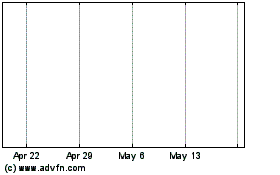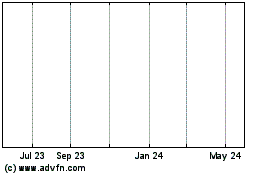Finish Line Still Distant For Baker Hughes Deal
December 11 2015 - 3:03AM
Dow Jones News
(FROM THE WALL STREET JOURNAL 12/11/15)
By Alison Sider and Brent Kendall
More than a year after it was announced, Halliburton Co.'s $35
billion deal to buy Baker Hughes Inc. is facing a growing list of
antitrust concerns from the U.S. Justice Department and other
competition authorities world-wide that could threaten the
combination.
Meanwhile, plunging oil prices have reduced demand for drilling,
complicating the oilfield-service giants' efforts to find buyers
for assets they would need to sell for the deal to pass regulatory
muster, executives and experts say.
The Justice Department, which is concerned the tie-up would
suppress competition, is questioning whether other companies could
buy some of these assets and become credible rivals to the combined
company, according to people familiar with the matter.
Halliburton recently met with the department's top antitrust
official, Bill Baer, to talk about the deal, some people familiar
with the deliberations said, a sign the review process has reached
a critical stage.
A Justice Department spokesman declined to comment.
Halliburton and Baker Hughes, which do the physical work of
drilling wells and extracting oil and natural gas for energy
companies, trail only Schlumberger Ltd. in the marketplace.
"Everything about this deal has turned out to be more
complicated and, frankly, more challenging than what was initially
envisioned," said William Herbert, co-head of securities at Simmons
& Co. International, an energy-focused investment bank in
Houston.
Across the Atlantic, Halliburton recently resubmitted its merger
filing to the European Commission, which had decided that important
information for assessing the transaction was missing from a filing
this summer. The commission has set a Jan. 12 deadline for clearing
the merger or starting an in-depth investigation.
The merger is also receiving continued antitrust scrutiny in
other countries including Australia, Brazil and China.
Antitrust authorities in Brazil and Australia have voiced
concerns about the sheer size of the deal for customers seeking a
package of integrated services from large firms like Halliburton
and Baker Hughes. Halliburton said it is working with regulators
around the world.
Christian Garcia, Halliburton's interim chief financial officer,
said Wednesday the company was confident the deal would close, but
conceded that the goal of wrapping it up in 2015 was all but dead.
He said the company is having "substantive discussions" with the
Justice Department as a Dec. 15 deadline looms.
The department isn't necessarily obligated to make a decision by
that date, because antitrust issues in other international
jurisdictions won't be resolved by then. The two sides have the
option to reach a new timing agreement.
Halliburton has argued that the merger will provide better value
for its customers, and that competition in the oil patch is already
intense, with low oil prices pushing every company to slash
prices.
Analysts expect Halliburton will go to great lengths to see the
deal through, even if it means selling off a lot of its product
lines at discounted prices.
Halliburton will have to pay $3.5 billion to Baker Hughes if
antitrust enforcers block their combination, but Baker Hughes also
has reason to remain committed to the deal's success. It would
likely emerge from a failed sales process even weaker than it was
before.
Baker Hughes declined to comment.
The price of crude oil had already started to slidefrom its June
2014 peak when the companies agreed to the tie-up in November that
year. Since then, oil-company clients have slashed their spending
plans, forcing oil-field service companies to do the same.
Halliburton and Baker Hughes have laid off nearly 35,000 employees
between them, or more than 20% of their respective workforces.
So far the companies have announced plans tosell overlapping
product linesthat generated $5.2 billion in revenue, and are
considering whether they will need to cast off more,according to
people familiar with the matter.They agreed last year to sell as
much as $7.5 billion worth of business if required by
regulators.
General Electric Co., which has expanded its oil-and-gas segment
in recent years, has signaled an interest in expanding and is an
active participant in the divestiture process, but no deal is
imminent, according to people familiar with the matter.
---
Ted Mann and Dana Mattioli contributed to this article.
(END) Dow Jones Newswires
December 11, 2015 02:48 ET (07:48 GMT)
Copyright (c) 2015 Dow Jones & Company, Inc.
Halliburton (NYSE:HAL.WD)
Historical Stock Chart
From Jul 2024 to Jul 2024

Halliburton (NYSE:HAL.WD)
Historical Stock Chart
From Jul 2023 to Jul 2024
